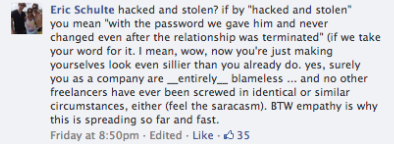
Image Credit: Passive Aggressive Notes
Last Friday, the DWRL hosted an RSA webinar featuring Dr. Rita Raley, Associate Professor of English and the University of California Santa Barbara. The webinar, which was broadcast over Google Hangouts thanks to our audio/visual team here in the DWRL, encouraged interactivity via social media and generated a lively discussion. I wanted to follow up on Dr. Raley’s talk about tactical media as speculative practice with an example from this week’s headlines: the “hacking” of a San Francisco based gym’s website by the site designer himself.
Fitness SF contracted Frank Jonen, an independent web developer, to design their website in May of 2012. On February 15, after nine months of non-payment, Jonen took action by re-claiming the website he designed as a means to “out” Fitness SF for non-payment.
His letter alleged, in part, that “Fitness SF preferred to ignore our invoices instead of paying them” and that “[a]s a result [Fitness SF’s] is no longer operational.” Jonen might have left it at that. Instead, his letter issued a call to arms. Under the heading “Do you hear the people sing, who will not be paid again,” Jonen appealed to other freelancing developers, designers, and journalists, saying, “I am also writing this on the behalf of the tens of thousands of freelancers and small businesses out there facing larger corporations who can afford to starve them out. In the movie/visual effects business this is already prevalent. Large studios awarding work to smaller studios or freelancers in the hope they won't stand up to them when it comes to loads and loads of unpaid work.” Finally, in a call to action, Jonen made heavy gestures toward solidarity among “the little guys” of the digital world: “An injury to one is an injury to all of us. We need to make a stand against crooks like this. If you'd like to join us in this fight, cancel your gym memberships, post on their Facebook pages, Tweet about it or even pass this on to a journalist.”

Image Source: Twitter
Hundreds, if not thousands, of users did just that. The story was picked up by several online national news venues, as well as other kinds of digital media. A Passive-Aggressive Notes subscriber, for instance, submitted the letter as an artifact of her own experience.
Simultaneously, Fitness SF crafted their own response via Facebook.

Image source: Fitness SF Facebook page
As the negative press poured in, the page’s moderators could hardly delete comments as fast as they were posted. Rather than angering posters, those sympathetic to Jonen’s plight interpreted the move as Fitness SF’s white flag of surrender. In short, all of Fitness SF’s attempts to defend themselves were ill-received and rhetorically ineffective on the large scale. As a direct result of these ill-advised PR moves, Fitness SF’s Yelp ratings took a nosedive.

Image Source: Google Search for Yelp ratings
And what were commenter’s major grievances? The vast majority of the conversation’s participants expressed disgust at Fitness SF’s inability to handle a simple billing dispute privately and called the gym out for unprofessionalism and image mismanagement.







Image Source: Screen Captures from Facebook
More than one commenter expressed displeasure at the gym’s use of the word “hacker,” interpreting it as a sign of additional ineptitude.


Image Source: Screencaptures from Facebook
The vast majority of Jonen’s supporters aligned their interest with his through the language of commerce, whether or not they themselves openly identified as small-business owners negotiating an increasingly-corporatized world. Although Jonen’s complete letter makes significant gestures toward anti-capitalistic attitudes, his internet audience sanitizes these claims by identifying Fitness SF as a “rule-breaker” rather than an emblem of systemic disadvantage. In short, audiences saw the relationship between corporations and small businesses as characteristic, not a flaw, of modern capitalism, and defended common business practice as the chief arbitrator of such disagreement, rather than the source of it.
In staking such claims, audiences also tended to place their faith in the court of public opinion, rather than a court of law, as the ultimate arbitrator in such a case. The frequency of comments identifying a “public relations” blunder exhibit audience awareness of content manufactured exclusively to manipulate them and a distaste for instances in which corporations unsuccessfully do so. In a strange rhetorical twist, those who participated in the debate often cited Fitness SF’s public airing of grievance as the most egregious event in the conflict, ignoring the fact that it was actually Jonen’s letter that launched the dispute into the public sphere. Commenters sent a distinct message to corporations: “Don’t, as a rule, expose me to or consult me about your private disputes—I am not interested in an ethics of disclosure. But if you do, expect me to disagree with you.” Similarly, audiences were much more like to agree with an individual’s complaint against a faceless corporation when the individual, as Jonen did, unmasks himself. But from such internally inconsistent rhetoric, it seems such audiences can hardly be counted on to take action outside of digital environs; their activism begins and ends in a brief digital moment that claims “going viral” as its chief mode of social change.
Perhaps I might, in closing, examine the digital artifacts this brief flurry of activity leaves behind. The news articles might be permanently linked to the gym as a Google search result, but Facebook comments will either eventually become buried under new material (as Facebook is notoriously difficult to navigate chronologically) or perhaps deleted all together. The longest-standing artifact that testifies to the controversy’s existence is the reviews of the business itself, now permanently tainted by the reduced average the complaint has brought to review pages like Yelp, despite these kinds of comments and ratings being in clear violation of Yelp’s policies against hearsay (“We want to hear about your firsthand consumer experience, not what you heard from your co-worker or significant other. Try to tell your own story without resorting to broad generalizations and conclusory allegations”). It is no coincidence, then, that a site that operates on a logic of consumer empowerment and crowd-sourced value judgments to cloak business promotion in democratic election will probably testify longest of the freelancer’s struggle against corporate America.











Recent comments
2 years 29 weeks ago
2 years 44 weeks ago
2 years 44 weeks ago
2 years 50 weeks ago
3 years 4 weeks ago
3 years 4 weeks ago
3 years 4 weeks ago
3 years 6 weeks ago
3 years 6 weeks ago
3 years 6 weeks ago